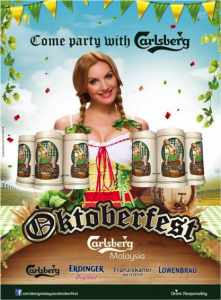Written by Irfarina Ahmad Nazli
In September 2017, multiple newspapers reported of a sensational headline which bore the words ‘beer festival banned’, garnering debates and international attention. Among these newspapers were The Star and New Straits Times, and online news portals including Free Malaysia Today and Malaysia Kini, and similarly, international news companies like Reuters and The Seattle Times.
This beer festival, or more popularly known as Oktoberfest, is the world’s largest beer event held annually, usually in towards the end of September to early October, hence its name. Large quantities of beer, recording to up to 7.5 million litres consumed in Germany alone, is served during this period and is conducted like a public festival would. To date, this event has attracted over six million visitors each year.

Image courtesy of Google
On the other hand, Malaysia too has been hosting Oktoberfest annually since year 2011. At the time it was first held in Malaysia, the event managed to garner about 200 participants while in 2016, the number more than tenfold to 3,500 participants and is expected to see 6,000 visitors this year if it was approved (The Malay Mail Online, 2017).
However, since 2014, the event began to draw opposing views, especially from religious groups like Malaysian Islamic Party (PAS) stating that it is not respectful to Muslims as they are observing Hari Raya Aidiladha around the same period the event was to be held. They also felt that Malaysia, being an Islamic country, should not have even approved the festival in the beginning, stating that this event may promote crime, free sex, rape and other malicious activities though it is under the pretext of encouraging tourism.
Additionally, Amidi Abdul Manan, the Deputy Chairman of People’s Justice Party (PKR) claimed that such festival drew concerns for public safety as the hosting country was reportedly said to have called the police 2,017 times to address 1,191 criminal cases
surrounding the time the event was held (The Star, 2017).
While Malaysia raised multiple eyebrows regarding the ban, local news report failed to mention how even Glasgow, a city in the United Kingdom too was against such celebration, refusing to grant the event managers alcohol license as reported by Express in 2016, an online news portal (Logan, 2016).
It was said that the festival caused the city to risk public safety, as hiccups in managing the event was evident in previous years, including lack of security, high levels of intoxication among its thousand visitors, and multiple violent outbreaks, making the Police Scotland and city councils hesitant in giving their approvals.
On a personal viewpoint, drinking beer is not completely banned in Malaysia. Citizens are still able to consume this beverage at its designated areas such in pubs or hotels, only that is it not encouraged to be done in such a huge public area, like the Oktoberfest would. The way the newspapers were reporting about this festival ban was as if drinking beer was banned altogether, making one wonder the need to be championing another country’s less related culture in a Muslim majority country.
In light of this issue, it can be said that the rights of the minority have not been compromised as beer itself is not banned, and yes, it does pose certain threats to other people in the surrounding area especially by irresponsible drinkers. Collective rights apply in this matter and if ever anything unpleasant comes out of it, it is Malaysia that will bear the brunt of consequences, tarnishing its name, and drinkers could hardly be blamed as they are partly unconscious of their behaviour when intoxicated. To sum up, Malaysia is not quite ready for festivals like Oktoberfest until proper conduct can be displayed by the “drinkers”.
In the author’s neighbourhood for example, the common ground or the public park in SS14 Subang Jaya meant for everyone to relax and exercise has been abused by thoughtless “drinkers”. Most often, our park is littered with empty beer cans (SJ Echo, 2017) and at times, pieces of broken beer bottles are left behind, causing harm to youngsters or the elderly whom regularly do recreational activities here.
SJ Echo, the Subang Jaya city’s newspaper also reported of the nuisance these “drinkers” have caused, coming in groups of 4-5 people in the night to drink and making noise, much to the dismay of the residents surrounding the park. Sometimes they were too drunk to leave and slept till sunrise at the park, oblivious to Subang Jaya Municipal Council’s (MPSJ) bylaws that punishes the act of drinking and littering in neighbourhood parks.
Therefore, the author agrees with the idea of placing a ban on Oktoberfest until Malaysians can illustrate exemplary behaviours and higher responsibility as part of the community.